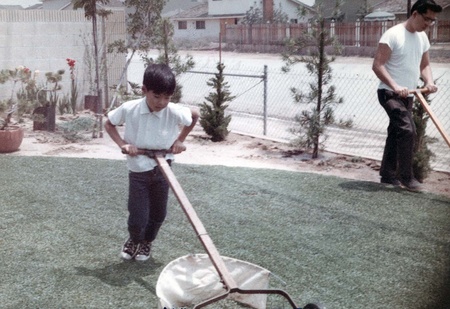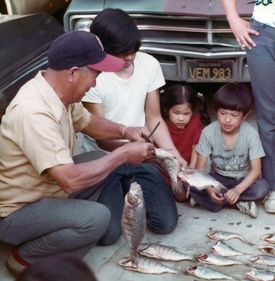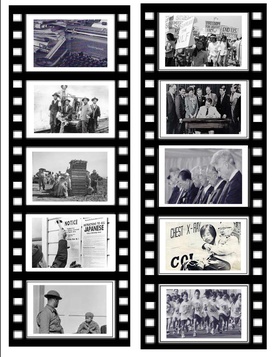In 2018, Mark Nakakihara founded the Zentoku Foundation, which is a non-profit organization dedicated to preserving stories of various generations of Japanese Americans. The Zentoku Foundation strengthens the Japanese American community by providing an enriching website and e-newsletters for all generations to cherish amazing stories, news, and upcoming events.
The Zentoku Foundation is unique because its meticulously delivered stories engulf its followers with deep, familial emotions. Much like the captivating emotions a bonsai enthusiast feels when observing the pure serenity of a completed bonsai, followers of the Zentoku Foundation sense the same harmony and raw emotions of each story. One can easily sense that Mark Nakakihara transcended his mastery in bonsai towards his passion to preserve and grow the Japanese American culture through the Zentoku Foundation.
Nakakihara’s passion to pass on the Japanese American culture led him in founding the Zentoku Foundation. He was born in Los Angeles in 1959 to Joe and Mae Nakakihara who were Nisei and Sansei, respectively. During his childhood, he did not realize that the knowledge and skills that his family taught him were steeped in the deeply rooted Japanese traditions of his ancestors. His father regularly taught him the art of bonsai, a traditional Japanese artform that dates back over a thousand years. Together with his father, they pruned trees like black pine, olive, juniper, and various podocarpus (pine family of trees). His father taught him about the aesthetic thought process and tradecraft involved in Japanese gardens—how to emplace rocks, lanterns, and various trees, to form a single harmonious expression of tranquility.
Nakakihara’s understanding and learning of the Japanese American culture was an extended-family affair. His paternal grandparents, Kazumi and Neri Nakakihara, kept the familial culture together by making mochi and having their annual New Year’s gatherings.
His maternal grandparents, Harry and Mary Mukogawa, taught him gardening, fishing, judo, as well as more mochi-making and other New Year’s traditions. As Nakakihara matured as an adult, he realized the importance of preserving Japanese American culture for future generations to learn from the rich cultural knowledge and skills that marked his childhood. Nakakihara realized that an effective way to preserve the Japanese American culture was through cultivating firsthand accounts of everyday stories.
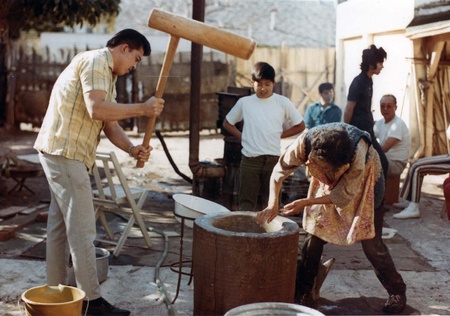
The connection between culture and stories
The Zentoku Foundation captures the Japanese American culture through the firsthand accounts of everyday stories of parents, grandparents, and great grandparents. One can view the plethora of rich stories that the Zentoku Foundation publishes on its website at zentokufoundation.org. Viewers are immediately taken into the earnest and humble community that epitomizes the Japanese American culture. The Zentoku Foundation has beautifully written the everyday stories of Japanese Americans engaging in their art-work-life such as: tea ceremony, cabinetmaking, fundraising, sushi making, distilled spirit making, and contemporary art.
To maintain its namesake of “Zentoku,” which means “virtue” and “doing the right thing,” the Zentoku Foundation’s process of capturing a memorable and inspirational story is an intense and rigorous process. Nakakihara explained, “I’ve always been a believer if you’re going to do something, then put in the time and do it right. The meaning of Zentoku was meant to be a statement that “doing the right thing” be held to each story, each project and everything else we do.” Once the Zentoku Foundation identifies a candidate to write a story about, the team dispatches an interviewer. Along with the interviewee, the Zentoku team of various directors, writers, editors, and the webmaster, collaborate to conduct numerous iterations of drafts and edits to ensure accuracy and effectiveness. The entire process to publish a story on its website takes three to six months.
The importance of preserving stories
The preservation of Japanese American stories is important because future generations need and yearn for firsthand accounts to understand their roots, culture, and identity. Nakakihara explained, “We don’t realize how many Japanese professions or arts we have been exposed to in our lives. I think back to how my father and grandfather taught me to be a gardener, to do bonsai trees, to do judo, to do Japanese cooking, fishing, etc. You want these and many more to be passed on to the next generations, so they understand how their grandparents and great grandparents perfected their traditions. The moment someone passes away, the firsthand accounts of their experience dies with them. Each day, another possible story passes away. The Issei are gone and the Nisei are declining. It’s up to the Sansei and Yonsei to know the importance of the ordinary people who did so much for their family and friends. If we don’t preserve their stories, their firsthand perspectives will be lost forever.” Not only are the preservation of stories critical for the younger generation, but the preservation process provides additional benefits.
The process of collecting stories often provides an added benefit for the interviewee’s family. Family members learn for the first time, the intricate details and thought process surrounding the interviewee’s decisions. Nakakihara further explained, “In most cases during the interview, the children didn’t realize that their mom or dad had done something in their life. This is great as it opens the door for the parents and children to communicate more about what they did in their life.” The interview provides a vehicle for expanded conversations regarding the family’s history and culture. The Zentoku Foundation preserves these stories to keep their experiences alive and counter the deterioration of the Japanese American culture.
The seed that started his creation
Nakakihara encountered an interesting experience that planted the seed to pursue his passion of creating the Zentoku Foundation. He explained, “A few years ago, I attended the funeral of a woman who was a historian. She documented her entire life and she even wrote her own eulogy. Through her eulogy, I got to listen to the firsthand account of what someone did in her life and why she did things, because she documented everything. I thought if there was an organization that could capture the lives of those ‘normal or ordinary’ people, then we could do some good with each life that was documented.” Nakakihara was in awe of her enlightening and thought-provoking eulogy. He realized the raw power that firsthand accounts harnessed.
The Japanese American culture is withering away
The Japanese American culture is slowly deteriorating, but it does not have to be this way. The Zentoku Foundation aims to promulgate the Japanese American culture, so it can flourish again. Nakakihara realized that the children of today’s society do not want to continue the business or skill sets of their parents and grandparents. The aggregate of those decisions result in a society where cultural skills and traditions are no longer ubiquitous. Through the Zentoku Foundation, Nakakihara aims to capture the firsthand accounts of Japanese Americans’ stories for future generations.
Nakakihara further explained, “We realize that as each generation passes, the Japanese American culture becomes less and less important. There are so many families where the children are reaching out to find out more about the Japanese American culture. We have a project called ‘Broken Branch’ where we have a group of younger generation individuals researching where the Japanese American tradition’s branch was broken in certain family trees. We are also teaching the older generations what the younger generations want to learn in their Japanese American traditions.” The Zentoku Foundation empowers individuals and their cultural journey to seek answers about their heritage and identity.
The challenges of preserving stories
The preservation of Japanese American stories presents three challenges: the low population who still maintain their cultural skill set, the aging of that population, and the modesty within that population. The population who still maintain a cultural skill set is a niche population within an already niche community within the United States.
Nakakihara explained, “Finding people who are adept in the traditions and cultures of skills such as bonsai, fishing, gardening, sushi making, tea ceremony, taiko, judo, karate, kendo, koi farming, odori, shamisen, and many more are few and far between.” Those early pioneers or masters in their field may be in their eighties and beyond so it is critical to get their firsthand accounts now when each passing day is precious. The modesty inherent within that population is another challenge.
The modesty inherent in older generations of Japanese Americans present another challenge to capture their stories. Nakakihara explained, “Most times the person doesn’t want to be interviewed as they say they are just a normal person. This is where we then must contact their children to see if they can convince their parent to be interviewed. Most times, we tell the interviewee that their story is not for them but for their children and their children, to have their life documented for future generations to know what they have accomplished in their lives.” In most cases, the older generations overcome their modesty because they realize that the preservation of their experiences provide significant value and inspiration for future generations.
Project: Paper Chase
The Zentoku Foundation recently completed a major two-year project named Paper Chase, which is the story of how Japanese American newspapers kept the Japanese American community together since the initial immigration of the Issei pioneers.
Nakakihara explained, “Our organization wanted to do something that hasn’t been done before. We knew there were a lot of documentaries covering life before the war, during the war, and after the war, but there hasn’t been one of the entire time that Japanese Americans have been here in America. We also wanted the public, especially the younger generations to know that the Japanese American newspapers were how the community was kept together and that without them, the community would not have had the means to stay connected. We hope this documentary heightens the awareness of these publications. This way, the Japanese American newspaper industry can maintain or grow their subscriptions and keep revenues high enough to continue in the future.” Paper Chase was the vision of Zentoku Foundation team member, Ellen Endo, who was the creator and producer. She enlisted Brett Kodama from New York to be the director and Stacey Yoshinaga to be the associate producer.
Through the eyes of the Japanese American newspaper industry, this monumental documentary vividly depicts the story that spans the timeline of over 150 years of Japanese Americans living in the United States. Nakakihara further explained, “These papers are slowly dying as there were as many as 60 of them years ago. There are only a few remaining such as the Rafu Shimpo, Pacific Citizen, Nichi Bei, Hawaii Herald, etc. The goal was to show the importance of these papers and how they have documented Japanese American history every day.” The Zentoku Foundation conceived the idea of creating this documentary in 2018. They completed it after two years of meticulous research, discussion, teamwork, editing, and numerous funding efforts. This highly anticipated and emotionally-moving documentary will be showing soon, dates and locations can be viewed on the Zentoku Foundation’s website.
Adapting to various preferences
The Zentoku Foundation understands the power and inspirational effectiveness that firsthand stories provide to society. They realize that people have different preferences in absorbing stories whether it’s through reading or watching and listening to videoed stories. They are growing to incorporate video interviews.
Nakakihara explained, “We are working on creating stories through video interviews. We want to diversify our stories to capture different followers because some read, and some may prefer video. We also are working on a project after our documentary that will require some travel. Toyota Motors, Kubota and other Japanese companies have relocated from Southern California to cities in Texas. Our goal is to take a team of writers, photographers and videographers to Plano, Texas, to document how a city with such a Japanese American presence today was formed from virtually nothing just a few years ago.” The Zentoku Foundation continues to seek ways to connect the Japanese American community throughout the United States.
Conclusion
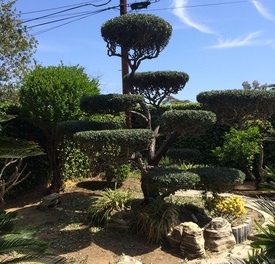
Equipped with the keen lens of a bonsai artist, passion for the Japanese American culture, and the leadership drive to build powerful teams, Nakakihara grew the seed bestowed by a late historian to create the Zentoku Foundation. People visiting the Zentoku Foundation website consistently find themselves engulfed in warm, familial emotions, which makes the Zentoku Foundation unique. The Zentoku Foundation meticulously delivers stories that depict a culture that is chock-full of deep relationships and tradecrafts. Through careful cultivation and participation with the community, the Zentoku Foundation continues to grow.
* * * * *
The premiere screening of Paper Chase: Japanese American History Through the Lens of Vernacular Newspaper at the Japanese American National Museum, originally scheduled for April 11, 2020 has been postponed. Please check janm.org for updates.
© 2020 Daijiro Don Kanase


